Laura P. Spinadel
Laura Patricia Spinadel (7 July 1958 in Buenos Aires, Argentina) is an Austrian Argentine architect, urban planner, writer, educator and principal of the firm BUSarchitektur and of the company BOA büro für offensive aleatorik in Vienna.[1][2] Laura P. Spinadel has made an international name based on her Compact City [3] and Campus WU works, both considered pioneers of the holistic architecture ideology.[4] She is Doctor Honoris Causa at the Civic Parliament of the Humanity, Transacademy Universal Institute of Nations.[5]
Laura P. Spinadel | |
|---|---|
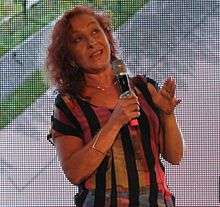 Laura P. Spinadel © BOAnet.at | |
| Born | 7 July 1958 Buenos Aires, Argentina |
| Nationality | Argentina-Austria |
| Occupation | Architect |
| Awards |
|
| Practice | BUSarchitektur & BOA büro für offensive aleatorik |
| Website | www |
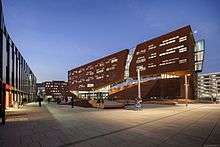
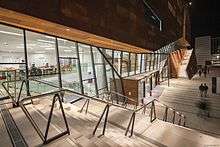
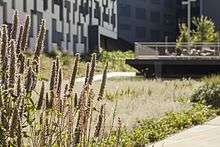
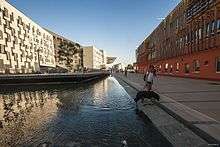
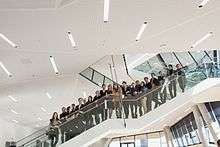
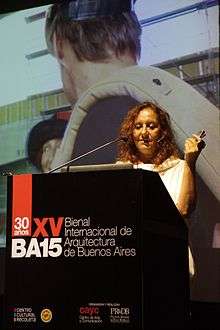
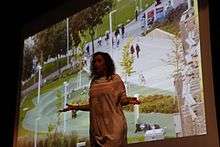
Education and teaching
Spinadel studied architecture at the FADU University of Buenos Aires where she was honoured with the Gold Medal Diploma.[6] Her mother, Vera W. de Spinadel was an Argentine mathematician considered a leader in the field of "Metallic Means".[7] Her father, Erico Spinadel is an Austrian engineer considered a world eminence in wind energy issues.[8]
In the mid-1980s, Spinadel taught at the University of Buenos Aires Urban Strategies and at the same time she was Director of Community Interactions for Foreign Relations and Co-operational Projects.[9] She served as guest professor at the Universidad Pontificia Bolivariana in Medellín, Colombia;[10] Università delli Studi di Palermo in Palermo, Italy; Escuela Superior Técnica de Arquitectura de Barcelona ETSAB in Barcelona, Spain;[11] MKSSS's Dr. B. N. College of Architecture – Pune, India;[12] Universidad Católica de Córdoba in Córdoba, Argentina; Colegio Oficial de Arquitectos de Tabasco in Villahermosa, México; Faculdade de Arquitetura da Universidade Federal do Rio Grande do Sul in Porto Alegre, Brazil.
Architecture and planning
The work of Laura P. Spinadel is marked by the pursuit of comprehensiveness in ideas, processes and results undoubtedly influenced by the anthroposophical education. Since starting out with a humanistic, theosophical and sensualist vision, Laura P. Spinadel has moved towards a holistic and ecological position, that seeks to put maximum emphasis on the health of open and closed spaces, as well as on the requirements and principles of bio-construction. Holistic thinking implies profoundly replacing rational and analytical thought with a more inclusive thinking, in which all factors are taken into account, even those that seem trivial or invisible, such as perception, health or freedom.[13][14] The Compact City in Vienna, Austria (1995-2001), was based on superimposed layers, compactness and high density structures. The project required that the architects get the agreement of many public and private company-stakeholders in order to create a completely self-contained autonomous block. The result is a layered city.[15] The Master Plan for the Campus WU (Vienna University of Economics and Business) in Vienna, Austria (2007-2015) is by nature as complex as it is evolutionary. It embodies a multivalent negotiation of scales, conceptual principles, architectural territories and operative methodologies. In this sense, the Master Plan operates as an interactive device and abstract machine, a living body that is, in the end, a subject of its own material evolution. The Master Plan as mediator promotes multi-scalar negotiations.[16]
Selected works
- Campus WU Vienna University of Economics and Business Administration Vienna II., Austria 2013[17]
- Teaching Center Campus WU Vienna II., Austria 2013[18]
- Housing Patchwork at the Hoffmannpark – Purkersdorf, Austria 2005[19]
- Homeworkers at the Compact City Vienna XXI., Austria 2002[20]
- Kindergarten at the Erlachplatz – Vienna X., Austria 1999[21]
Awards
At the XV International Biennial of Architecture of Buenos Aires BA 15, Spinadel won the BA 15 Award and also the Contest of the International Committee of Architectural Critics CICA 2015 in Urbanism.[22][23] In 2015, she was honoured with the Architecture Award of the City of Vienna. She is the first woman awarded 2014 with the Golden Ring of Honour of Vienna University of Economics and Business.[24] Other prestigious awards and honors received by Laura P. Spinadel include: Ernst A. Plischke Award 2014,[25] Otto Wagner Urban Design Award Az W PSK 1998,[26] Outstanding Artist Award for Experimental Trends in Architecture BMUK 1989 [27] among others.
Museum exhibitions
- Indian Art House Gallery – Pune, India 2016[28]
- Austrian Cultural Forum – Washington, USA 2015[29]
- Centro Cultural Recoleta – Buenos Aires, Argentina 2013 2011[30][31]
- Architekturzentrum Wien Vienna, Austria 2009[32]
- Austrian Cultural Forum New York USA 2003[33]
- Semper Depot Wien – Vienna, Austria 2003[34]
Bibliography
Books by Laura P. Spinadel include Campus WU: A Holistic History – Editor BOA büro für offensive aleatorik – 2013 ISBN 978-3950366600; Urban unconscious – BUSarchitektur & Friends– Libria Editrice – 2003 ISBN 88-87202-44-3; Perceptions by BUSarchitektur – Projects and Buildings 1986/1999 Libria Editrice 2001 ISBN 88-87202-15-X
References
- "View all information for Laura P. Spinadel". archINFORM. archINFORM. Retrieved 8 December 2017.
- "Biography Laura Spinadel". Austria Forum. Austria Forum, Technical University Graz. Retrieved 14 August 2016.
- "Compact City". WikiArquitectura. Retrieved 14 August 2016.
- "Playing from the inside: Holistic Villages as a Paradigm" (PDF). Studies of Architecture, Urbanism and Environmental Sciences Journal (abbreviation: SAUES). Retrieved 7 December 2017.
- "Doctor honoris causa for holistic architecture to Laura P. Spinadel". Parlamento Cívico de la Humanidad. Civic Parliament of the Humanity. Archived from the original on 13 September 2016. Retrieved 14 August 2016.
- "Gold Medal to Laura P. Spinadel". Un día Una arquitecta. Retrieved 14 August 2016.
- "Vera W. de Spinadel - The Metallic Means and Design". Nexus Network Journal. Retrieved 31 July 2017.
- "Asociación Argentina de Energía Eólica". AAEE. Retrieved 15 August 2016.
- "FADU". plataforma arquitectura. Retrieved 14 August 2016.
- "Universidad Pontificia Bolivariana". FAUPB taller. Retrieved 14 August 2016.
- "Taller Laboratorio de la vivienda del Siglo XXI" (PDF). ETSAB. Retrieved 14 August 2016.
- "Holistic Villages A tangible dream". BNCA. Retrieved 14 August 2016.
- Montaner, Josep Maria (25 November 2013). "Holistic Architecture on Campus". Plataforma de Arquitectura. BOA büro für offensive aleatorik. Retrieved 12 August 2016.
- "Architecture under the skin. Laura P. Spinadel". WPS prague. Retrieved 14 August 2016.
- "Compact City". Public Space. public space. Retrieved 15 August 2016.
- Berman, Ila; El Khafif, Mona (25 November 2013). "Master Plan as mediator". Campus WU A holistic history. BOA büro für offensive aleatorik. Retrieved 12 August 2016.
- "WU Campus Masterplan / BUSarchitektur". ArchDaily. Retrieved 15 August 2016.
- "Teaching Center in WU Campus by BUSarchitektur". Design Exchange. Retrieved 15 August 2016.
- "Hoffmann geht spazieren Residential". Wikiarquitectura. Retrieved 15 August 2016.
- "Compact City". Architekturzentrum Wien. Retrieved 15 August 2016.
- "Kindergarten Erlachplatz". Architekturzentrum Wien. Retrieved 15 August 2016.
- "Award BA 15". ARQA. Retrieved 7 December 2017.
- "CICA Awards Buenos Aires Biennale 2015". International Committee of Architectural Critics. International Committee of Architectural Critics. Retrieved 15 August 2016.
- "Goldener Ehrenring". Vienna University of Economics and Business. Retrieved 8 December 2017.
- "Ernst A. Plischke Award". Plischke Society. Retrieved 18 December 2015.
- "2. Otto Wagner Städtebaupreis - Preisverleihung und Ausstellung". Architekturzentrum Wien. Retrieved 8 December 2017.
- "outstanding artist award – Experimentelle Tendenzen in der Architektur". Bundeskanzleramt Österreich, Kunst und Kultur. Retrieved 8 December 2017.
- "Campus WU: A Holistic History". ihag. Retrieved 15 August 2016.
- "Exhibition Opening Washington". Austrian Cultural Forum. Retrieved 15 August 2016.
- "ENERGIAXXI Laura Spinadel". Fecoba TV. Retrieved 15 August 2016.
- "Orgullo nacional en Viena". Revista Nueva. Retrieved 8 December 2017.
- "BIG Az W: Exhibition Campus WU". Architekturzentrum Wien. Retrieved 15 August 2016.
- "Az W in New York: housing in vienna". Architekturzentrum Wien. Retrieved 15 August 2016.
- "Urban Unconscious - Homage an Claudio Blazica". Architekturzentrum Wien. Retrieved 15 August 2016.
External links
| Wikimedia Commons has media related to Laura Spinadel. |
- BUSarchitektur
- BOA Büro für offensive Aleatorik
- Objekte ergeben noch keine Stadt Portrait in "Die Presse"
- VII Foro Internacional de Parques
- Studieren im Wunderland
- Stadtwachstum ohne Nachverdichtung?
- Architecture Today BUSarchitektur
- On Location Vienna WU Campus